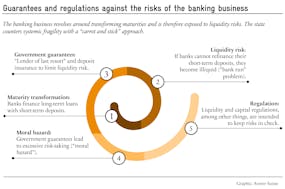Anarchists and libertarians have one mistake in common: both believe that a community can function without sovereign institutions. Classic liberals have never had anything to do with such enthusiasms. Whether Immanuel Kant, John Locke or Montesquieu, they were all aware that freedom can only ever exist in a constitutional state. Thomas Hobbes formulated this most radically with his idea of leviathans, the almighty state that guarantees the freedom and security of its citizens.
It is therefore not surprising, now that the coronavirus is keeping the world in suspense, that some want such a powerful state. It is also not surprising that left-wing apologists believe in billions of dollars in government-funded programs motivated by industrial policy, and national conservative circles are repeating their exclusion mantra — currently against the “foreign” virus threat — this time with comprehensive border security.
This desire for the omnipresent state in liberal Switzerland is obviously primarily based on autocratically governed China, since the country seems to have got the pandemic under control in its own territory by draconian means. It remains to be seen whether the statistics prove correct and the trend reversal sustainable. Market-oriented democracies such as Taiwan and South Korea have been just as successful.
A duty towards citizens and companies
Nevertheless, the Swiss authorities have a particular duty to combat the spreading coronavirus pandemic. According to the federal constitution, the federal government takes measures to protect the health of the population. No sensible liberal can deny the state its important role in the current pandemic. Coping with such a situation is really the hour of the state, because maintaining social order is one of the core tasks of sovereignty. The state has to take responsibility.
It is known that in the event of a pandemic, because of the rarity of the event, combined with its global dimension, certain markets fail – which is why damage in the event of a pandemic is often also excluded from insurance. State stocks and preventive measures for this exceptional situation are therefore part of the emergency provisions. In addition, during a pandemic, individual behavior has adverse effects on society in the form of contagions, as well as coordination problems in avoiding contagions. Here, too, the state is obliged to resort to sovereign measures such as assembly bans, even if this represents a massive encroachment on individual fundamental rights.
State failure in the stupidest place
The fact that the state is challenged in such a crisis does not mean that the entire free system must be called into question. A strong state is different from a very large or tyrannical one. What is efficient and effective in the preparation and management of a rare crisis is by no means the case in normal times. In the past decades, the global market for medical devices has ensured that hospitals are adequately supplied. However, the state has to take appropriate measures in the event of a crisis – and that does not seem to have worked in Switzerland, at least in part. In spite of existing regulations, the preparation for pandemic situation developments was neglected. This was done in all transparency and was also recorded in reports. Nevertheless, the responsible parties did not follow the prescribed storage of essential medical devices. It’s a state failure in the stupidest place.
There is also a private obligation
It is encouraging that the FOPH also recognizes the individual’s personal responsibility: from relevant hygiene regulations for washing hands (which should have been valid for everyone since childhood) to the new German “social distancing,” the implementation of which will probably still be a lot of trouble for those sociable northerners. But private responsibility in pandemic situations is not exactly in evidence: 350,000 people gathered in Madrid last weekend and 200,000 in Barcelona last weekend. And in Germany there were Bundesliga games in front of over 50,000 spectators.
In order to cope with the pandemic situation, the liberal state should put its primary focus on protecting the health of the population, not with panic reactions, but by planning for scenarios that have been prepared for years in partnership with the private sector, which is especially important during crises due to its flexibility and adaptability. Yet this does not release you from individual responsibility. Otherwise, the call for more restrictive, if not illiberal, measures will become increasingly louder.
This article, originally published by Avenir Suisse on March 13, was translated into English by the Economic Standard.





